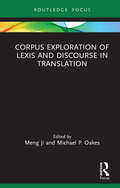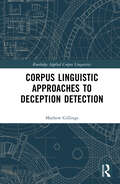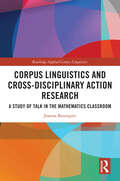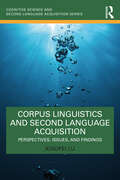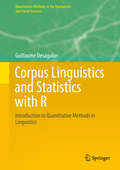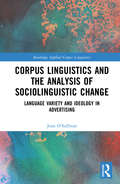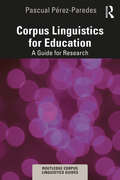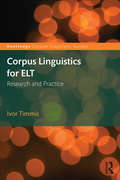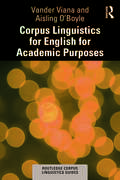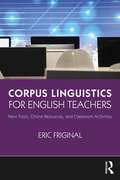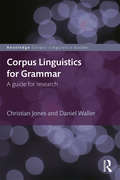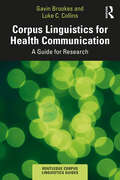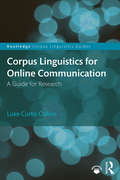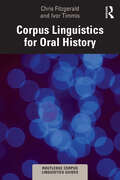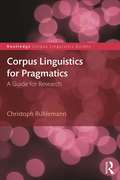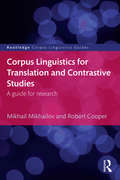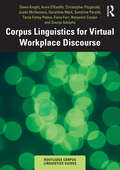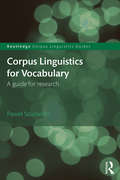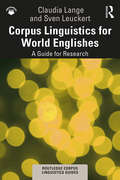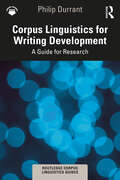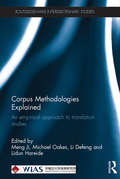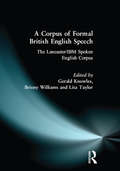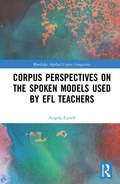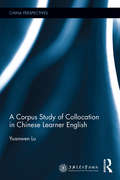- Table View
- List View
Corpus Exploration of Lexis and Discourse in Translation (Routledge Studies in Empirical Translation and Multilingual Communication)
by Meng Ji Michael P. OakesThis edited volume reflects on the development of corpus translation studies as a rapidly growing, diversified field of translation studies. It examines the evolving identity of corpus translation from a marginal research tactic focusing on generating numeric corpus attributes to a powerful and increasingly sophisticated corpus analytical scheme and methodological paradigm that has significantly changed and continues to shape our understanding of the research and practical, social values of empirical translation studies. Since its inception in the 1990s, corpus translation studies have permeated through almost every corner and branch of contemporary translation studies – from literary translation stylistics, through cognitive and neural translation, to more socially oriented translation studies, such as health care, environmental, and political and policy translation. Corpus methodological innovation has become a central research aim and priority in some of the most dynamic areas of translation studies. Methodological advancement has as its main aim a better, enhanced understanding on the part of translation studies scholars of the internal factors and external variables that may account for the prevalence of certain translation features (for example, corpus textual and linguistic patterns). This edited collection presents the latest studies of corpus-based and corpus-driven specialised translation and will appeal to students and scholars of translation studies, in particular those interested in corpus translation.
Corpus Linguistic Approaches to Deception Detection (ISSN)
by Mathew GillingsCorpus Linguistic Approaches to Deception Detection provides an innovative introduction to the use of the corpus linguistics methodology in the field of deception detection.Bringing together research from both forensic psychology and linguistics, this book uses traditional corpus-assisted methods to reconcile the different approaches used by these two fields and shows how “cues to deception” operate in their linguistic context. Arguing that current methods of analysis do not seem to be fit for purpose, this book shows the need for further development of context-sensitive methods to explore deceptive datasets.This book will be of interest to scholars and postgraduate students in the fields of corpus linguistics, psychology, discourse analysis, and forensic linguistics.
Corpus Linguistics and Cross-Disciplinary Action Research: A Study of Talk in the Mathematics Classroom (Routledge Applied Corpus Linguistics)
by Joanna BaumgartIn this book, Joanna Baumgart offers a detailed and innovative account of how a mixed methods approach, combining corpus linguistics and discourse analysis, can shed light on educational practice. Corpus Linguistics and Cross-Disciplinary Action Research is based on a 22,000-word corpus of mathematics lessons in a multicultural secondary school in Ireland with the analysis of classroom data supported by insights from reflective meetings with the participating teacher. It demonstrates how examination of video recordings of lessons and reflective conversations facilitate discursive changes in the classroom and increase teacher awareness of classroom interaction. Throughout, the role of teacher talk is used as a model in the subject-specific discourse into which students are socialized. Baumgart also relates the story of a successful interdisciplinary approach to action research, thereby providing an example of how talk and interaction can be examined within wider educational contexts. Building on the premise of the key role which language, and talk in particular, plays in teaching and learning processes, this book will be of keen interest to teacher-educators as well as researchers in the fields of corpus linguistics, discourse analysis and educational linguistics.
Corpus Linguistics and Second Language Acquisition: Perspectives, Issues, and Findings (Cognitive Science and Second Language Acquisition Series)
by Xiaofei LuIn Corpus Linguistics and Second Language Acquisition, Xiaofei Lu comprehensively reviews empirical studies that employ corpus linguistic methods to investigate issues in second language variation, processing, production, and development. These methods enable advanced students and researchers to: Examine learner and task variables that condition variation in second language use Understand the effects of various input factors on second language processing and production Track group longitudinal trajectories of second language development and the input, learner, and task factors that affect such trajectories Profile inter- and intra-learner variability and individual variation in second language longitudinal development This book will serve as an excellent resource for students and researchers with interests in corpus linguistics and second language acquisition.
Corpus Linguistics and Statistics with R: Introduction to Quantitative Methods in Linguistics (Quantitative Methods in the Humanities and Social Sciences)
by Guillaume DesagulierThis textbook examines empirical linguistics from a theoretical linguist's perspective. It provides both a theoretical discussion of what quantitative corpus linguistics entails and detailed, hands-on, step-by-step instructions to implement the techniques in the field. The statistical methodology and R-based coding from this book teach readers the basic and then more advanced skills to work with large data sets in their linguistics research and studies. Massive data sets are now more than ever the basis for work that ranges from usage-based linguistics to the far reaches of applied linguistics. This book presents much of the methodology in a corpus-based approach. However, the corpus-based methods in this book are also essential components of recent developments in sociolinguistics, historical linguistics, computational linguistics, and psycholinguistics. Material from the book will also be appealing to researchers in digital humanities and the many non-linguistic fields that use textual data analysis and text-based sensorimetrics. Chapters cover topics including corpus processing, frequencing data, and clustering methods. Case studies illustrate each chapter with accompanying data sets, R code, and exercises for use by readers. This book may be used in advanced undergraduate courses, graduate courses, and self-study.
Corpus Linguistics and the Analysis of Sociolinguistic Change: Language Variety and Ideology in Advertising (Routledge Applied Corpus Linguistics)
by Joan O'SullivanCorpus Linguistics and the Analysis of Sociolinguistic Change demonstrates how particular styles and varieties of language are chosen and represented in the media, to reveal changing language ideologies and sociolinguistic change. Drawing on a corpus of ads broadcast on an Irish radio station between 1977 and 2017, this book shows how corpus linguistic tools can be creatively employed, in conjunction with frameworks and concepts such as audience and referee design and indexicality, and examines how accents and dialects (vernacular and prestige) are exploited in the ads across the decades. In addition, this book: illustrates the key principles of corpus design for sociolinguistics studies and offers a framework for future diachronic corpus studies of advertising on social media; provides a model for analysing corpus data at both inter-varietal and intra-varietal levels in terms of both accent and dialectal features and explores the efficacy of using particular corpus linguistic tools; identifies key factors which can be used by researchers as evidence for sociolinguistic change and links these factors to relevant theories and frameworks; demonstrates how corpus tools can be used to compare advertising discourse with naturally occurring discourse, with particular reference to markers of (pseudo) intimate discourse. Building on the growing body of research relating to variation and change in Irish English, this book is key reading for researchers and advanced students undertaking research within the areas of sociolinguistics and corpus linguistics.
Corpus Linguistics for Education: A Guide for Research (Routledge Corpus Linguistics Guides)
by Pascual Pérez-ParedesCorpus Linguistics for Education provides a practical and comprehensive introduction to the use of corpus research-methods in the field of education. Taking a hands-on approach to showcase the applications of corpora in the exploration of educationally relevant topics, this book: • covers 18 key skills including corpus building, the role of frequency, different corpus methods, transcription and annotation; • demonstrates the use of available corpora and desktop and online corpus analysis tools to conduct original analyses; • features case studies and step-by-step guides within each chapter; • emphasises the use of interview data in research projects. Corpus Linguistics for Education is an essential guide for students and researchers studying or conducting their own corpus-based research in education.
Corpus Linguistics for ELT: Research and Practice (Routledge Corpus Linguistics Guides)
by Ivor TimmisCorpus Linguistics for ELT provides a practical guide to undertaking ELT-related corpus research. Aimed at researchers, advanced undergraduate and postgraduate students of ELT and TESOL, and English language teachers, this volume: covers corpus research in the main areas of language study relevant to ELT: grammar, lexis, ESP, spoken grammar and discourse; presents a review of relevant corpus research in these areas, and discusses the implications of this research for ELT; suggests potential ELT-focused corpus research projects, and equips the reader with all the required tools and techniques to carry them out; deals with the growing area of learner corpora and direct classroom application of corpus material. Corpus Linguistics for ELT empowers and inspires readers to carry out their own ELT corpus research, and will allow them in turn to make a significant contribution to corpus-informed ELT pedagogy.
Corpus Linguistics for English for Academic Purposes (Routledge Corpus Linguistics Guides)
by Vander Viana Aisling O'BoyleThis book shows how corpus analyses can enhance students’, practitioners’ and researchers’ knowledge of academic language. The book provides a reader-friendly discussion of the key concepts, practices and research applications of corpus linguistics which are relevant to the EAP community. The volume: • empowers readers to compile and analyze EAP-relevant corpora to support their practice; • draws on open-access resources, allowing readers in all contexts to engage in corpus analyses; • examines how corpus studies have advanced the description of spoken, written and computer-mediated academic discourses; • contains numerous reflective and hands-on tasks. Corpus Linguistics for English for Academic Purposes is an essential book for EAP students, practitioners and researchers who wish to develop corpus analytical skills to support their learning, teaching and research practice. It is equally important to novice corpus linguists who wish to find out how they can contribute to the ever-expanding area of EAP.
Corpus Linguistics for English Teachers: Tools, Online Resources, and Classroom Activities
by Eric FriginalCorpus Linguistics for English Teachers: New Tools, Online Resources, and Classroom Activities describes Corpus Linguistics (CL) and its many relevant, creative, and engaging applications to language teaching and learning for teachers and practitioners in TESOL and ESL/EFL, and graduate students in applied linguistics. English language teachers, both novice and experienced, can benefit from the list of new tools, sample lessons, and resources as well as the introduction of topics and themes that connect CL constructs to established theories in language teaching and second language acquisition. Key topics discussed include: • CL and the teaching of English vocabulary, grammar, and spoken-written academic discourse; • new tools, online resources, and classroom activities; and • focus on the "English teacher as a corpus-based researcher." With ready-to-use teaching vignettes, tips and step-by-step guides, case studies with practitioner interviews, and discussion of corpora and corpus tools, Corpus Linguistics for English Teachers is a thoughtfully designed and skillfully executed resource, bridging theory with practice for anyone looking to understand and apply corpus-based tools dynamically in the language learning classroom.
Corpus Linguistics for Grammar: A guide for research (Routledge Corpus Linguistics Guides)
by Christian Jones Daniel WallerCorpus Linguistics for Grammar provides an accessible and practical introduction to the use of corpus linguistics to analyse grammar, demonstrating the wider application of corpus data and providing readers with all the skills and information they need to carry out their own corpus-based research. This book: explores the kinds of corpora available and the tools which can be used to analyse them; looks at specific ways in which features of grammar can be explored using a corpus through analysis of areas such as frequency and colligation; contains exercises, worked examples and suggestions for further practice with each chapter; provides three illustrative examples of potential research projects in the areas of English Literature, TESOL and English Language. Corpus Linguistics for Grammar is essential reading for students undertaking corpus-based research into grammar, or studying within the areas of English Language, Literature, Applied Linguistics and TESOL.
Corpus Linguistics for Health Communication: A Guide for Research (Routledge Corpus Linguistics Guides)
by Gavin Brookes Luke C. CollinsCorpus Linguistics for Health Communication provides an accessible and practical introduction to the use of corpus linguistics methods to analyse health-related language use across various contexts and genres. Offering a critical review of the field, discussion of extended case studies, and practical exercises based on spoken, written, and digital language data, this book: introduces the fields of health communication and corpus linguistics and critically reviews cutting-edge studies in the burgeoning area of corpus-based health communication; describes the processes involved in planning a corpus linguistics study of health communication, including designing and building a corpus, selecting tools, and implementing techniques of analysis; demonstrates how corpus linguistics methods can – and have – been applied to the study of spoken, written, and digital health communication, offering critical reflections and suggesting areas for future development. Corpus Linguistics for Health Communication is essential reading for those working at the interface of corpus linguistics and health communication. Both those with a little or a lot of experience in either field will find value in its pages.
Corpus Linguistics for Online Communication: A Guide for Research (Routledge Corpus Linguistics Guides)
by Luke Curtis CollinsCorpus Linguistics for Online Communication provides an instructive and practical guide to conducting research using methods in corpus linguistics in studies of various forms of online communication. Offering practical exercises and drawing on original data taken from online interactions, this book: introduces the basics of corpus linguistics, including what is involved in designing and building a corpus; reviews cutting-edge studies of online communication using corpus linguistics, foregrounding different analytical components to facilitate studies in professional discourse, online learning, public understanding of health issues and dating apps; showcases both freely-available corpora and the innovative tools that students and researchers can access to carry out their own research. Corpus Linguistics for Online Communication supports researchers and students in generating high quality, applied research and is essential reading for those studying and researching in this area.
Corpus Linguistics for Oral History (Routledge Corpus Linguistics Guides)
by Chris Fitzgerald Ivor TimmisCorpus Linguistics for Oral History takes a step-by-step approach to presenting how corpus linguistics tools and techniques can be applied to oral history archives. Bridging the gap between the two areas, this book: establishes a framework to pursue this type of research and guides the reader through tasks that will ensure practical application shows how oral narratives can facilitate historical linguistics, including historical sociolinguistics and historical pragmatics illustrates how the techniques of corpus linguistics can help social historians to analyse oral narratives in new and fruitful ways takes readers through each step of the process, from initial close readings of data to constructing a corpus that adheres to parameters of representativeness, through to the application of various corpus linguistics techniques includes an appendix of resources and examples of extracts from a global range of historical texts throughout, introducing the reader to a range of freely accessible, digitized archives This book is key reading for students and researchers working in History and Corpus Linguistics. History students will find a new perspective on approaching primary historical sources, while linguistics students will find insights into an avenue of data worthy of multiple levels of linguistic analysis.
Corpus Linguistics for Pragmatics: A guide for research (Routledge Corpus Linguistics Guides)
by Christoph RühlemannCorpus Linguistics for Pragmatics provides a practical and comprehensive introduction to the growing field of corpus pragmatics. Taking a hands-on approach to showcase the applications of corpora in the exploration of core topics within pragmatics, this book: <li>covers six key areas of corpus-pragmatic research including speech acts, deixis, pragmatic markers, evaluation, conversational structure, and multimodality; <li>demonstrates the use of freely-available corpora, corpus interfaces and corpus analysis tools to conduct original pragmatic analyses; <li> is accompanied by an e-resource which hosts multimodal data sets for additional exercises. <P><P>Featuring case studies and practical tasks within each chapter, Corpus Linguistics for Pragmatics is an essential guide for students and researchers studying or conducting their own corpus-based research in pragmatics.
Corpus Linguistics for Translation and Contrastive Studies: A guide for research (Routledge Corpus Linguistics Guides)
by Robert Cooper Mikhail MikhailovCorpus Linguistics for Translation and Contrastive Studies provides a clear and practical introduction to using corpora in these fields. Giving special attention to parallel corpora, which are collections of texts in two or more languages, and demonstrating the potential benefits for multilingual corpus linguistics research to both translators and researchers, this book: explores the different types of parallel corpora available, and shows how to use basic and advanced search procedures to analyse them; explains how to compile a parallel corpus, and discusses their uses for translation purposes and to research linguistic phenomena across languages; demonstrates the use of corpus extracts across a wide range of texts, including dictionaries, novels by authors including Jane Austen and Mikhail Bulgakov, and newspapers such as The Sunday Times; is illustrated with case studies from a range of languages including Finnish, Russian, English and French. Written by two experienced researchers and practitioners, Corpus Linguistics for Translation and Contrastive Studies is essential reading for postgraduate students and researchers working within the area of translation and contrastive studies.
Corpus Linguistics for Virtual Workplace Discourse (Routledge Corpus Linguistics Guides)
by Dawn Knight Anne O'Keeffe Christopher Fitzgerald Justin McNamara Geraldine Mark Sandrine Peraldi Tania Fahey Palma Fiona Farr Benjamin Cowan Svenja AdolphsCorpus Linguistics for Virtual Workplace Discourse provides a thorough and practical step-by-step guide to constructing and analysing a multi-modal corpus of virtual meetings. It draws from original data from video recordings of virtual meetings with a variety of participant profiles from various industries, alongside examples of images and transcriptions from this data to illustrate key points.This cutting-edge volume contextualises the field through previous corpus studies of interaction in a workplace context, as well as a description of various technology mediated interactions, culminating in video-mediated interaction, before outlining the cross-section of these two areas in describing the characteristics of virtual meetings. An overview of multi-modal corpus analysis provides examples and analysis of virtual meetings from a multi-modal perspective, demonstrating what is unique about virtual workplace discourse. The text concludes by presenting how multi-modal corpus analysis can aid understanding and delivery of virtual meetings through suggestions regarding meeting management. At various stages throughout the book, readers will engage with tasks that promote critical thinking at each phase of background research and data analysis. This will ensure that practical learning outcomes are achieved as well as broad insights gained into multi-modal corpus analysis of virtual meetings.This timely, prescient text is essential reading to students and researchers in corpus linguistics and any applied linguistics scholar interested in workplace communication, as well as valuable reading for any students or scholars in business communication.
Corpus Linguistics for Vocabulary: A Guide for Research (Routledge Corpus Linguistics Guides)
by Paweł SzudarskiCorpus Linguistics for Vocabulary provides a practical introduction to using corpus linguistics in vocabulary studies. Using freely available corpus tools, the author provides a step-by-step guide on how corpora can be used to explore key vocabulary-related research questions and topics such as: The frequency of English words and how to choose which ones should be taught to learners; How spoken vocabulary differs from written vocabulary, and how academic vocabulary differs from general vocabulary; How vocabulary contributes to the structure of discourse, and the pragmatic functions it fulfils. Featuring case studies and tasks throughout, Corpus Linguistics for Vocabulary provides a clear and accessible guide and is essential reading for students and teachers wanting to understand, appreciate and conduct corpus-based research in vocabulary studies.
Corpus Linguistics for World Englishes: A Guide for Research (Routledge Corpus Linguistics Guides)
by Claudia Lange Sven LeuckertCorpus Linguistics for World Englishes offers a detailed account of how to analyse the many fascinating varieties of English around the world using corpus-linguistic methods. Employing case studies for illustration of relevant concepts and methods throughout, this book: introduces the theory and practice of analysing World Englishes illustrates the basics of corpus-linguistic methods and presents the vast World Englishes corpora links World Englishes to Learner Englishes and English as a Lingua Franca offers practical, hands-on exercises and questions for discussion in each chapter provides helpful overviews and course syllabi for students and instructors. Corpus Linguistics for World Englishes is key reading for advanced students of English as a World Language and Corpus Linguistics, as well as anyone keen to understand variation in World Englishes with the help of corpus linguistics.
Corpus Linguistics for Writing Development: A Guide for Research (Routledge Corpus Linguistics Guides)
by Philip DurrantCorpus Linguistics for Writing Development provides a practical introduction to using corpora in the study of first and second language learners’ written language over time and across different levels of proficiency. Focusing on development in the use of vocabulary, formulaic language, and grammar, this book • discusses how corpus research can contribute to our understanding of writing development and to pedagogical practice; • reviews a range of corpus techniques for studying writing development from the perspectives of vocabulary, grammar, and formulaic language and interrogates the methodological bases of those techniques; and • guides readers to perform practical analyses of learner writing using the R open-source programming language. Aimed at the novice researcher, this book will be key reading for advanced undergraduate and postgraduate students in the fields of education, language, and linguistics. It will be of particular interest to those interested in first or second language writing, language assessment, and learner corpus research.
Corpus Methodologies Explained: An empirical approach to translation studies (Routledge-WIAS Interdisciplinary Studies)
by Michael Oakes Meng Ji Li Defeng Lidun HareideThis book introduces the latest advances in Corpus-Based Translation Studies (CBTS), a thriving subfield of Translation Studies which forms an important part of both translator training and empirical translation research. Largely empirical and exploratory, a distinctive feature of CBTS is the development and exploration of quantitative linguistic data in search of useful patterns of variation and change in translation. With the introduction of textual statistics to Translation Studies, CBTS has geared towards a new research direction that is more systematic in the identification of translation patterns; and more explanatory of any linguistic variations identified in translations. The book traces the advances from the advent of language corpora in translation studies, to the new textual dimensions and shift towards a probability-variation model. Such advances made in CBTS have enabled in-depth analyses of translation by establishing useful links between a translation and the social and cultural context in which the translation is produced, circulated and consumed.
A Corpus of Formal British English Speech: The Lancaster/IBM Spoken English Corpus
by Briony Williams Gerry Knowles Lita TaylorThis work provides 50,000 words of prosodically-transcribed text from a variety of sources. The introduction explains fully the transcription conventions, the structure of the corpus and its relationship to other computer corpora, and provides examples of different versions of texts.
Corpus Perspectives on the Spoken Models used by EFL Teachers (Routledge Applied Corpus Linguistics)
by Angela FarrellCorpus Perspectives on the Spoken Models used by EFL Teachers illustrates the key principles and practical guidelines for the design and exploitation of corpora for classroom-based research. Focusing on the nature of the spoken English used by L2 teachers, which serves as an implicit target model for learners alongside the curriculum model, this book brings an innovative perspective to the on-going academic debate concerning the models of spoken English that are taught today. Based on research carried out in the EFL classroom in Ireland, this book: explores issues and challenges that arise from the use of "non-standard" varieties of spoken English by teachers, alongside the use of Standard British English, and examines the controversies surrounding sociolinguistic approaches to the study of variation in spoken English; combines quantitative corpus linguistic investigations with qualitative functional discourse analytic approaches from pragmatics and SLA for classroom-based research; demonstrates the ways in which changing trends and perspectives surrounding spoken English may be filtering down to the classroom level. Drawing on a corpus of 60,000 words and highlighting strategies and techniques that can be applied by researchers and teachers to their own research context, this book is key reading for all pre- and in-service teachers of EFL as well as researchers in this field.
Corpus Pragmatics
by Christoph Rühlemann Karin AijmerCorpus linguistics is a long-established method which uses authentic language data, stored in extensive computer corpora, as the basis for linguistic research. Moving away from the traditional intuitive approach to linguistics, which used made-up examples, corpus linguistics has made a significant contribution to all areas of the field. Until very recently, corpus linguistics has focused almost exclusively on syntax and the lexicon; however corpus-based approaches to the other subfields of linguistics are now rapidly emerging, and this is the first handbook on corpus pragmatics as a field. Bringing together a team of leading scholars from around the world, this handbook looks at how the use of corpus data has informed research into different key aspects of pragmatics, including pragmatic principles, pragmatic markers, evaluation, reference, speech acts, and conversational organisation.
A Corpus Study of Collocation in Chinese Learner English (China Perspectives)
by Yuanwen LuCollocation is an important tool in describing lexical behaviour in language and has received increasing attention in recent years. Based on two corpora: LOCNESS (the Louvain Corpus of Native English Essays) and MLC (the Non-English major Mainland Chinese Learner Corpus), this book explores the features of Chinese learner English with analysis of grammatical and lexical collocations. The findings show that Chinese university students use collocations with considerably less variety and Chinese language and culture exert a substantial influence on their English writing. It also discusses ways to tackle the problems Chinese English learners face and the pedagogical implications for teaching English and learning English collocations. As one of the first systematic studies to investigate collocations in Chinese learner English based on learner corpora, this book not only analyzes how Chinese learners use collocations in their English writing, but also provides significant implications for foreign language teaching and learning.
